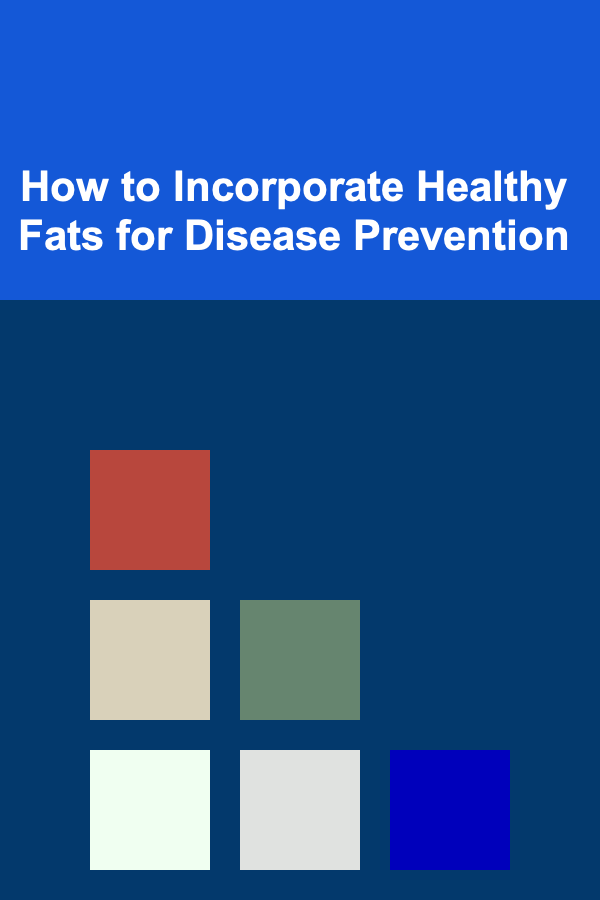
How to Incorporate Healthy Fats for Disease Prevention
ebook include PDF & Audio bundle (Micro Guide)
$12.99$8.99
Limited Time Offer! Order within the next:

In recent decades, the notion of fats in our diet has undergone a significant transformation. Once regarded as the enemy of health due to its association with heart disease and obesity, fats have now earned a more nuanced reputation. As scientific research continues to advance, experts now differentiate between healthy and unhealthy fats, recognizing that some fats are essential for maintaining good health and preventing disease.
Healthy fats are essential for various bodily functions, from hormone regulation to brain health. However, many people still struggle to include these fats in their diets while avoiding unhealthy, processed fats that contribute to chronic diseases. This article explores how to incorporate healthy fats into your daily diet to improve overall health and reduce the risk of chronic diseases.
What Are Healthy Fats?
Before diving into how to incorporate healthy fats into your diet, it's important to understand what they are and why they are beneficial.
Healthy fats, also referred to as unsaturated fats, are fats that provide essential fatty acids---omega-3 and omega-6---and are beneficial to health. These fats are typically found in plant-based oils, nuts, seeds, fish, and avocados.
There are two main types of healthy fats:
- Monounsaturated Fats (MUFAs): These fats are typically liquid at room temperature and can help reduce harmful LDL cholesterol levels, which are associated with heart disease. Foods rich in monounsaturated fats include olive oil, avocados, and nuts.
- Polyunsaturated Fats (PUFAs): These fats are also liquid at room temperature and include omega-3 and omega-6 fatty acids. Omega-3 fatty acids, in particular, are known for their heart-health benefits and anti-inflammatory properties. Sources of polyunsaturated fats include fatty fish like salmon, walnuts, flaxseeds, and chia seeds.
Both monounsaturated and polyunsaturated fats are vital for maintaining healthy cell membranes, supporting brain function, and reducing inflammation in the body.
The Importance of Healthy Fats for Disease Prevention
Incorporating healthy fats into your diet is crucial for disease prevention, as these fats offer a wide range of health benefits that can help reduce the risk of chronic diseases. Below are some key reasons why healthy fats should be prioritized in your diet.
1. Heart Health
Research has shown that a diet rich in healthy fats can significantly reduce the risk of heart disease. Healthy fats, especially monounsaturated and omega-3 fatty acids, help reduce LDL (low-density lipoprotein) cholesterol, commonly known as "bad" cholesterol, while increasing HDL (high-density lipoprotein) cholesterol, or "good" cholesterol. This balance is essential for preventing atherosclerosis (plaque buildup in the arteries), which can lead to heart attacks and strokes.
Omega-3 fatty acids, in particular, have been found to have anti-inflammatory effects that protect the cardiovascular system. They reduce blood clotting and lower blood pressure, further promoting heart health.
2. Brain Health and Cognitive Function
Healthy fats, especially omega-3 fatty acids, are critical for brain health. The brain is composed of about 60% fat, and consuming the right types of fats can support cognitive function, improve memory, and reduce the risk of neurodegenerative diseases such as Alzheimer's.
Omega-3 fatty acids are essential for the growth and maintenance of brain cells and have been shown to improve mood and reduce symptoms of depression and anxiety. Studies also suggest that a diet rich in omega-3s may help prevent cognitive decline in older adults and improve mental clarity and focus.
3. Anti-Inflammatory Benefits
Inflammation is a root cause of many chronic diseases, including heart disease, diabetes, arthritis, and even cancer. Healthy fats, particularly omega-3 fatty acids, have strong anti-inflammatory effects, which can help reduce the risk of these diseases.
Omega-3s found in fatty fish like salmon, mackerel, and sardines are particularly effective in reducing inflammation in the body. By replacing unhealthy fats with healthy fats, such as omega-3s, you can significantly decrease inflammation and lower your risk of inflammatory diseases.
4. Weight Management
Contrary to the belief that eating fats leads to weight gain, healthy fats can actually help with weight management. Healthy fats, especially those high in omega-3s, promote feelings of satiety and reduce the risk of overeating. They help stabilize blood sugar levels and prevent spikes in insulin, which can lead to fat storage.
Additionally, consuming healthy fats in moderation supports healthy metabolism and helps the body burn fat more efficiently. Including sources of healthy fats, like avocado or olive oil, can enhance your diet's nutritional profile while preventing unhealthy weight gain.
5. Hormonal Balance
Healthy fats are essential for hormone production. Hormones, which regulate vital functions such as metabolism, reproduction, and immune response, are made from fats. The body requires fats to produce sex hormones, such as estrogen and testosterone, as well as stress hormones like cortisol.
Inadequate intake of healthy fats can disrupt hormonal balance, leading to conditions like hormonal imbalances, reproductive issues, and chronic stress. Consuming adequate amounts of healthy fats can help ensure that your body's hormonal systems function properly, reducing the risk of related diseases.
How to Incorporate Healthy Fats into Your Diet
Now that we understand the importance of healthy fats for disease prevention, the next step is learning how to incorporate them into your daily meals. Below are practical tips on how to make healthy fats a part of your diet.
1. Use Olive Oil for Cooking and Dressings
Olive oil is a staple in the Mediterranean diet, which is known for its heart-healthy benefits. It's rich in monounsaturated fats and antioxidants, making it an excellent choice for cooking or drizzling over salads. Replace butter or vegetable oils with olive oil for sautéing, roasting, and grilling.
Extra virgin olive oil is particularly high in polyphenols, which have anti-inflammatory properties. For salad dressings, combine olive oil with balsamic vinegar, lemon juice, or herbs for a simple and flavorful dressing.
2. Add Avocados to Your Meals
Avocados are a rich source of monounsaturated fats and are loaded with vitamins, minerals, and fiber. You can add sliced avocado to salads, sandwiches, or toast for an extra dose of healthy fats. Avocados can also be blended into smoothies, used as a base for creamy dressings, or mashed as a substitute for butter in baking.
3. Snack on Nuts and Seeds
Nuts and seeds are packed with healthy fats, fiber, and protein, making them an excellent snack option. Almonds, walnuts, chia seeds, and flaxseeds are particularly rich in omega-3 fatty acids. You can add nuts to oatmeal, yogurt, or baked goods, or simply enjoy a handful as a snack.
Be mindful of portion sizes, as nuts and seeds are calorie-dense. A small handful of nuts can provide a satisfying and nutritious snack.
4. Consume Fatty Fish Regularly
Fatty fish, such as salmon, mackerel, sardines, and trout, are excellent sources of omega-3 fatty acids, which are essential for heart and brain health. Aim to include fatty fish in your diet at least two to three times a week. Grilled, baked, or pan-seared fish is a delicious and nutritious way to incorporate healthy fats into your meals.
If fresh fish is not available, canned fish (such as canned salmon or sardines) is a convenient and affordable alternative. Just be sure to choose options packed in water or olive oil rather than vegetable oil for the healthiest choice.
5. Incorporate Flaxseed and Chia Seeds
Flaxseeds and chia seeds are rich in omega-3 fatty acids and fiber, making them an excellent addition to your diet. You can add these seeds to smoothies, yogurt, oatmeal, or baked goods. They are also great as a topping for salads or mixed into homemade energy bars.
Both flaxseed and chia seeds are best consumed ground or soaked, as this increases their digestibility and nutrient absorption.
6. Try Coconut Oil in Moderation
Coconut oil is a saturated fat, but it contains medium-chain triglycerides (MCTs), which are metabolized differently from other saturated fats. MCTs are quickly converted into energy and may support fat burning. Coconut oil can be used in cooking or as a replacement for butter in baking. However, it's important to use coconut oil in moderation due to its high-calorie content.
7. Include Nut Butters
Nut butters, such as almond butter, peanut butter, and cashew butter, are delicious and nutritious sources of healthy fats. Spread nut butter on whole-grain toast, add it to smoothies, or dip fruits like apple slices or bananas into it for a healthy snack.
Opt for natural nut butters without added sugars or hydrogenated oils for the healthiest option.
Conclusion
Incorporating healthy fats into your diet is essential for preventing chronic diseases, supporting brain health, and maintaining overall well-being. By choosing monounsaturated and polyunsaturated fats from whole food sources like avocados, fatty fish, nuts, and seeds, you can reduce the risk of heart disease, inflammation, and other chronic conditions.
While fats are an essential part of a balanced diet, moderation is key. Strive to replace unhealthy fats with healthy fats and make mindful choices when it comes to your overall diet. By taking small steps to incorporate more healthy fats into your meals, you can create a nourishing and disease-preventing lifestyle that will support your long-term health.

How to Decorate a Small Apartment on a Budget
Read More
How to Set Up a Cleaning Caddy for Easy Access
Read More
How to Set Up a Pet-Proof Space for Your New Puppy or Kitten
Read More
How to Soundproof Your Walls Without Major Renovations
Read More
How to Use Foam Panels for Sound Absorption
Read More
Reducing Water Runoff Pollution for Wildlife
Read MoreOther Products

How to Decorate a Small Apartment on a Budget
Read More
How to Set Up a Cleaning Caddy for Easy Access
Read More
How to Set Up a Pet-Proof Space for Your New Puppy or Kitten
Read More
How to Soundproof Your Walls Without Major Renovations
Read More
How to Use Foam Panels for Sound Absorption
Read More